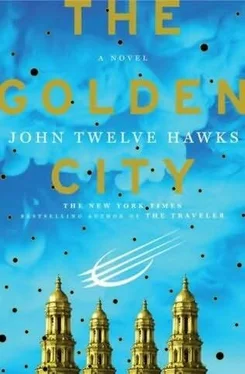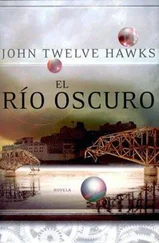The priest stirred sugar into his tea, and then used a spoon to mash the sprig of mint against the side of the glass. “How do you know Hossam?”
“I’ve done business with him involving antiquities,” Lumbroso said. “Your cousin has a good eye for what is real and what is a fake.”
“Hossam says you are a man who keeps promises. That is difficult to find in this city.”
“I know that the Coptic Church is being persecuted.”
“Our young men are beaten and arrested for nothing. My church has no electricity and the roof leaks when it rains.”
Lumbroso touched his breast. A wallet filled with Egyptian pounds was concealed within the inner pocket of his suit coat. “We would reward the person with accurate information. We are looking for-”
“Hossam told me everything. You want a passageway that will take you to another world.” Father Youssef drank his tea with a loud slurping sound and put down the glass with a click. “Most people do not care about these passageways. All they want is a new car and a big television.”
Simon dropped a lump of sugar into his coffee. “We thought that a passageway might be connected to the pyramids. They’ve been a special location for thousands of years.”
“The pyramids were built for the dead. A passageway is for the living.”
Looking annoyed, Linden leaned forward and touched the priest’s arm. “Tell us something of value and your church will get a new roof.”
“The Coptic Church is poor and persecuted. They have taken everything from us, including our sacred chapel. It guards the way to another world.”
“And who controls this chapel?” Linden asked.
“The Greek Orthodox Church. I talk about the Sacred and Imperial Monastery of the God-Trodden Mount of Sinai.”
Lumbroso turned to Gabriel. “Most people know it as St. Catherine’s Monastery. It was built by the Emperor Justinian during the Sixth Century.”
“Our church had a shrine at Mount Sinai before the monastery was built. It was called the Chapel of the Burning Bush. Do you think Moses got his vision from a plant on fire? The burning bush was just a children’s story that someone invented to protect the passageway.”
“Can we go there?” Gabriel asked. “Will the priests let us in?”
Father Youssef spat on the dirt. “When pilgrims arrive at the monastery, the Greeks show them a bush growing outside the church. The chapel with the passageway is in a room behind the altar.”
“What if we offered them a donation?” Lumbroso asked.
“If the monks think you know their secret, they will call the police and have you arrested.”
Looking annoyed, Linden shook his head. Ce prêtre est inutile , he whispered to Simon.
“I want to be helpful,” Youssef insisted. “I can draw you a map of the church and show you the hidden chapel. But you should forget about this and go back to Europe. Passageways are dangerous. If you cross over, you can be trapped in a world with demons or ghosts. Only a saint can take such a journey, and there are no more saints.”
Simon Lumbroso smiled. “Certain rabbis tell us that a handful of hidden saints keep this world from being destroyed.”
“That’s a big responsibility,” Gabriel said. “I don’t know if that’s true.”
“It is not true.” Father Youssef tapped on the table with his spoon. “The Age of Saints is over. God no longer speaks directly to men and women. We speak to ourselves and pray to the echo.”
Simon Lumbroso arranged for a car and driver, and they left that night for St. Catherine’s monastery; Gabriel and Simon in the back seat and Linden in front with the driver. The Renault sedan had a scratched and dusty exterior, but the driver had installed red velvet carpet on the floors and decorated the dashboard with plush dogs. A family of Yorkshire terriers stared at Gabriel with little glass eyes as the car glided past the walled palaces of the Egyptian military and headed east.
The four-lane highway cut a straight line across a flat desert landscape. Occasionally they passed a military installation protected by a high wall or a barbed wire fence, but no one other than soldiers appeared to be living in the area. Their Egyptian driver was a small, quiet man with a pencil-thin moustache. He kept the Renault in the middle of the road-aiming straight at each pair of oncoming headlights, and then swerving to one side at the last possible moment before they smashed into a trailer truck or a lumbering gasoline tanker.
The sun was coming up when they reached the outskirts of Suez. The driver showed his travel permit at three army checkpoints, and then they entered the tunnel lined with white tile that passed beneath the canal. When they reemerged into the sunlight, they had left the African continent and entered the Sinai Peninsula. Linden stretched his legs and arms, then tilted the rearview mirror so he could see out the back window. The driver began to protest, but Linden glared at him. “If you want some extra money, then leave the mirror alone. I like to travel this way, looking at my past.”
The sun rose higher and the driver switched on the air conditioner. Every hour or so they passed a city with a smokestack and a power plant, a mosque and a cluster of pastel pink apartment buildings-the entire community dumped into a bare landscape of sand and scattered rocks. All the Egyptians had disappeared except for women on the side of the road selling melons that looked like little green cannonballs.
By nine in the morning, they had reached the seaside resorts on the Gulf of Suez. For Egyptians, recreation and luxury was all about palm trees; each resort would announce its presence with date palms in the median strip or a row of weary looking doum palms by the side of road. Finally, billboards would appear and then a boulevard lined with Royal Palms that led to a hotel and a strip of beach.
More check points-some run by the police, others by the army. Linden glanced over the seat at Simon Lumbroso. “It feels like half the population of Egypt is checking the passes of the other half.”
“There’s a lot of unemployment in this country,” Simon explained. “This gives them something to do.”
After stopping at a gas station, they left the beach resorts and headed inland toward a range of grey mountains. The cliffs and hills around them were eroded by the wind, and sand covered portions of the two-lane road. Simon was dozing now, but Gabriel sensed that something was wrong. Linden adjusted the rearview mirror a second time and then his hand brushed against one of the knives strapped to his lower legs.
“Stop the car,” he said.
The driver looked startled. “Is there a problem, sir?”
“Stop the car. Now.”
“We are about thirty minutes away from the monastery.”
“I want to contemplate le paysage.”
The driver turned off the road and parked on sandy patch of ground. Linden grabbed his knapsack with one hand and glanced over the seat at Gabriel and Simon. “All of us want to look at the scenery,” he announced. “Let’s go.”
The two men followed Linden up a hill covered with desert vegetation. It was hot and dry on the ridge and there were no shade trees to protect them from the sun.
“I enjoy looking at a picturesque landscape,” Lumbroso said. “But this scrap of desert is not particularly impressive.”
“We might have a problem.” Linden reached into the knapsack and pulled out a pair of binoculars. “A silver pickup truck has followed us for about ten kilometers. I want to know if they made the same turn.”
Simon and Gabriel stood quietly as the Frenchman studied the road.
“See anything?” Simon asked.
“No.”
“Good,” Gabriel said. “Let’s get back in the car.”
Читать дальше












